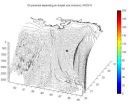(Press-News.org) This press release is available in French.
These results reveal how the immune system can then limit the effectiveness of some cancer chemotherapies. The researchers now intend to block the molecules responsible for negative immune system activation to increase the efficiency of chemotherapy. A clinical trial to test this hypothesis should begin very soon.
Chemotherapy is one of the most frequently used treatments to eliminate cancerous cells. These drugs kill all cells that are multiplying, or block their proliferation (for example, cells responsible for hair growth, explaining the hair loss of treated patients). In addition to their direct toxic effects, the chemotherapeutic agents also seem to act on the immune system and could make it possible for the body to trigger a direct antitumor immune response in a second phase.
However, this last point is still the subject of hot debate, since some studies suggest, conversely, that chemotherapy eliminates all immune defences.
What now?
The Inserm team directed by Professor François Ghiringhelli (Inserm unit 866 "Lipids, nutrition and cancer") from the Georges François Leclerc Cancer Research Centre in Dijon observed that two chemotherapeutic agents, 5-fluorouracile and gemcitabine, used to treat colon, breast and pancreas cancers activate a protein complex "inflammasome NLRP3" within some cells in the immune system.
To be more specific, this activation leads to releasing proinflammatory cytokine (interleukin IL-1beta) through these cells. This cytokine "distorts" the immune response related to lymphocytes T and causes the production of another cytokine (cytokine IL-17), which has protumoral properties by encouraging tumour angiogenesis, i.e. vascular irrigation of tumours.
"Our results have made it possible to ascertain that the activation of inflammasome limits the effectiveness of chemotherapy. The challenge was then to see whether we could prevent the activation of inflammasome"
explains François Ghiringhelli. The researchers then tested two different strategies:
The first was to test the two drugs on inflammasome NLRP3- or cytokine IL-17-deficient mice. In these cases, the researchers showed that antitumor activity was not only present, but it actually increased, demonstrating that these two elements (NLRP3 and IL-17) slow down the chemotherapy action.
The second strategy was to treat the mice using an IL-1beta inhibitor. Here again, the effectiveness of chemotherapy was again increased.
These results suggest that targeting the inflammasome and IL-1beta channels, combined with the use of these two chemotherapy agents, can improve the effectiveness of the latter. These tumour cells are eliminated and, in parallel, the damaging immune responses are deleted.
A therapeutic trial combining 5-fluorouracil and IL-1 beta is currently being prepared and should begin soon at the Georges François Leclerc Cancer Research in Dijon.
### END
Improving chemotherapy effectiveness by acting on the immune system
2012-12-04
ELSE PRESS RELEASES FROM THIS DATE:
Numerical study suggests subsea injection of chemicals didn't prevent oil from rising to sea surface
2012-12-04
MIAMI — December 4, 2012 - The 2010 blowout of the Macondo well in the waters of the Gulf of Mexico resulted in the region's largest oil spill in U.S. history. As the Deepwater Horizon (DWH) incident unfolded, in an effort to prevent the oil from coming to the surface and reaching coastal and marsh ecosystems, chemical dispersants were injected at the wellhead. These powerful dispersants, typically used to break up oil slicks at the sea surface had never been used in such large quantities and over such a prolonged period of time in the deep ocean.
A new study published ...
New study reveals lions are rapidly losing ground in Africa
2012-12-04
A new study released this week confirms that lions are rapidly and literally losing ground across Africa's once-thriving savannahs due to burgeoning human population growth and subsequent, massive land-use conversion. Representing the most comprehensive assessment of the state and vitality of African savannah habitat to date, the report maintains that the lion has lost 75% of its original natural habitat in Africa – a reduction that has devastated lion populations across the continent.
Co-authored by Panthera's Lion Program Survey Coordinator, Dr. Philipp Henschel, and ...
Annals of Internal Medicine tip sheet for Dec. 4, 2012
2012-12-04
1. American College of Physicians Says Upper Endoscopy Overused in Patients with Reflux
Routine use of upper endoscopy for most patients with gastroesophageal reflux disease (GERD) does not improve patient health, is associated with preventable harms, and may lead to unnecessary interventions and costs, says the American College of Physicians (ACP) Clinical Guidelines Committee in a new evidence-based clinical policy paper. Heartburn, a symptom of GERD, is a common reason for people to see a doctor. Long term complications of GERD can include scarring of the esophagus ...
American College of Physicians: Upper endoscopy is overused in patients with heartburn
2012-12-04
PHILADELPHIA, December 4, 2012 -- Heartburn is one of the most common reasons for people to see a doctor, and some physicians often use upper endoscopy to diagnose and manage gastroesophageal reflux disease (GERD). But most patients do not require the procedure unless other serious symptoms are present, according to the American College of Physicians (ACP) Clinical Guidelines Committee in a new evidence-based clinical policy paper published today in Annals of Internal Medicine.
"The evidence indicates that upper endoscopy is indicated in patients with heartburn only when ...
Healthy eating beneficial beyond drug therapy in preventing a second heart attack
2012-12-04
Hamilton, ON (Dec. 3, 2012) - A heart-healthy diet rich in fruits, vegetables and fish significantly reduces the chance of a second heart attack and stroke in people with cardiovascular disease, McMaster University researchers have found.
A five-year study of almost 32,000 patients (average age 66.5 years) in 40 countries discovered those who ate a heart-healthy diet had a:
35 per cent reduction in risk for cardiovascular death
14 per cent reduction in risk for new heart attacks
28 per cent reduction in risk for congestive heart failure
19 per cent reduction ...
Healthy diet may help prevent recurrent heart attacks, strokes
2012-12-04
If you have cardiovascular disease, a heart-healthy diet may help protect you from recurrent heart attacks and strokes, according to new research in the American Heart Association journal Circulation.
"At times, patients don't think they need to follow a healthy diet since their medications have already lowered their blood pressure and cholesterol — that is wrong," said Mahshid Dehghan, Ph.D., study author and a nutritionist at the Population Health Research Institute, McMaster University in Hamilton, Ontario, Canada. "Dietary modification has benefits in addition to those ...
Social media may help fight childhood obesity
2012-12-04
Social media may be an effective tool to help children overcome obesity, according to a new American Heart Association scientific statement.
The statement is published online in the association's journal Circulation.
"Online communication and social media are an increasing part of our lives and our overall social network of family, friends and peers," said Jennifer S. Li, M.D., M.H.S., chair of the writing group. "Healthcare providers should embrace its potential as a tool for promoting healthy behavioral change."
The writing group evaluated research on Internet-based ...
New findings on glucagon synthesis
2012-12-04
Researchers at Karolinska Institutet in Sweden have shown that the cells that produce glucagon are stimulated by the hormone itself. A previous study by the same group demonstrated that this principle also applies to insulin. This means that a feedback system is at work in the body, whereby hormone secreting cells receive an immediate signal to produce more of the hormone.
While insulin is a hormone that lowers the level of glucose in the blood, glucagon is a hormone that increases it. Associate Professors Barbara and Ingo Leibiger and Professor Per-Olof Berggren at ...
Why older adults become fraud victims more often
2012-12-04
Why are older people especially vulnerable to becoming victims of fraud? A new UCLA study indicates that an important clue may lie in a particular region of the brain that influences the ability to discern who is honest and who is trying to deceive us.
Older people, more than younger adults, may fail to interpret an untrustworthy face as potentially dishonest, the study shows. The reason for this, the UCLA life scientists found, seems to be that a brain region called the anterior insula, which is linked to disgust and is important for discerning untrustworthy faces, ...
Longer treatment for male UTI not associated with reduced early or late recurrence risk
2012-12-04
CHICAGO – A study of more than 33,000 outpatient male veterans suggests that a longer duration of antimicrobial treatment of more than seven days for a urinary tract infection (UTI) appeared not to be associated with a reduced risk of early or late recurrence compared to a shorter duration (seven days or less) of treatment, according to a report published Online First by Archives of Internal Medicine, a JAMA Network publication.
The optimal treatment duration for UTI in ambulatory, noncatheterized women is well defined, but the optimal treatment duration in men is unknown. ...


